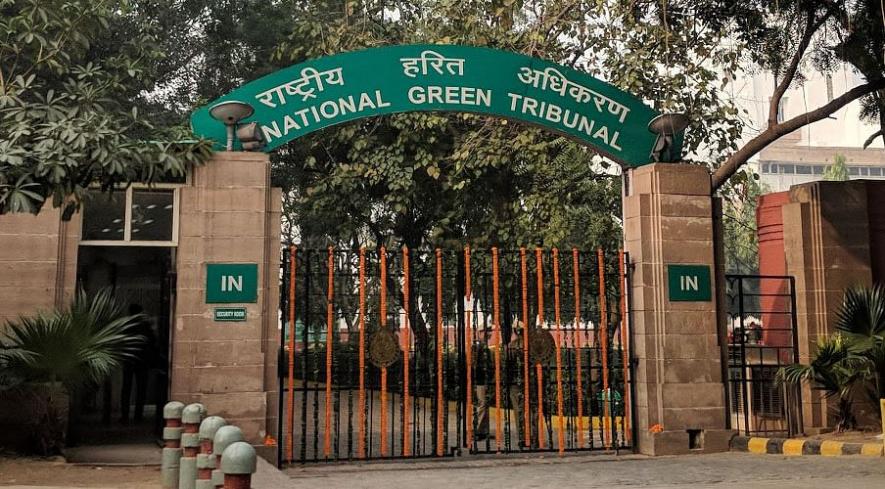Did Haryana Government Allow Illegal Chemical Units to Operate under Industrial Lobby Pressure ?

Image Courtesy: Bar and Bench
New Delhi: The decision by the BJP-led government in Haryana to allow manufacturers of a carcinogenic chemical to continue operations without the prior Environmental Clearance has been stone-walled by the National Green Tribunal (NGT). The Manohar Lal Khattar government had issued the said policy in November last year for 15 Formaldehyde manufacturers. The companies had been operating for several years without bothering to assess the environmental impact of their projects.
The tribunal ruled on June 3 that the Haryana government had neither the power to grant exemptions to the industries, nor to allow them to continue with their operations by simply accepting compensation from them against the lapse.
“We thus hold that without prior EC [Environmental Clearance] the units cannot be allowed to operate. The State has no power to exempt the requirement of prior EC or to allow the units to function without EC on payment of compensation … We are of the view that since prior EC is statutory mandate, the same must be complied,” ordered a five-judge bench of the tribunal headed by its Chairperson Justice Adarsh Kumar Goel.
Ten of the 15 industrial units are located in Haryana's Yamunanagar district; two each in Jhajjar and Karnal districts while one is located in Ambala. The policy, which allowed the units to continue operations if they applied for ECs within 60 days, was issued by Haryana quick on the heels of a demand from a lobby representing the interests of the industries.
Dastak, a non-governmental organization (NGO), which had filed the petition in the NGT, had alleged that these 15 industries, which together consumed a humongous six lakh litres of water a day, used to meet their needs by extracting groundwater without any clearance from the Central Ground Water Authority, New Delhi. It was further alleged that the industries had no clearance under the Manufacture, Storage and Import of Hazardous Chemicals Rules, 1989. The operations of these industries was opposed by the NGO based on reports which say that Haryana records the maximum percentage of cancer deaths in the country.
“The industries operate in the middle of agricultural farmlands without any buffer zone. The areas where these water-guzzling industries are located are already stressed with low water tables. They cause water pollution by pumping back effluents into the soil sub-surface by reverse boring. They cause air pollution by releasing harmful particulate matter and also toxic oxides of Nitrogen and Sulphur through their chimneys,” said environmental lawyer Dr. S.S. Hooda.
Was the policy decision taken under pressure from the industrial lobby?
On October 23, 2020, the All Haryana Formaldehyde Manufacturers Association wrote to the Additional Chief Secretary in the Directorate of Environment & Climate Change requesting to allow them to continue operations and also for sufficient time to obtain clearances. The Haryana government issued its policy decision barely a fortnight later, on November 10, 2020.
A query has been emailed to the Additional Chief Secretary asking, apart from other questions, how the industrial units had been allowed to operate without there having been any environment impact studies whatsoever, despite the fact that the organisations are covered under Serial No. 5 (f) of the Environmental Impact Assessment (EIA) Notification, 2006. There has been no by the time this news article was published. The article will be updated when any response has been received. .
Interestingly, in a counter-affidavit filed with the NGT in March 2021, the Haryana government justified its decision to provide relief to the affected industries on the ground that the window for accepting EC applications had been shut down by the Union Ministry of Environment, Forests & Climate Change pending the publication of new rules pertaining to Environment Impact Assessments of industrial projects. The Khattar government also backed the industries and claimed that the units had been operating in “good faith” and with valid consent from the state pollution control board.
But how did the industries obtain consent from the pollution control board despite the factthat they had no green clearances? As per the Haryana State Pollution Control Board (HSPCB), the consents had been granted due to an “oversight”.
“Regional offices of the pollution control board granted the consents perhaps in oversight because of the fact that categorisation of industries is a dynamic process that keeps on changing from time to time. In certain neighboring states, industries falling in this category have been operating without prior Environmental Clearances. In any case, we have now begun the process of imposing penalties upon these industries under the polluter pays principle in accordance with the order of the green tribunal. All these industries are shut down at present and have also applied for EC as per the tribunal’s direction,” S.Narayanan, Member Secretary, Haryana State Pollution Control Board told Newsclick.
The fact that a number of Formaldehyde industries had been operating without mandatory green clearances in Haryana came to light when the NGT ordered the closure of one such unit in 2019. Immediately thereafter, the state pollution control board went into an overdrive and ordered the closure of all similar units to which it had provided consent for operations. The industries appealed against the closure orders through a civil writ petition in the High Court of Punjab & Haryana. However, this appeal was withdrawn by the industries in March this year in view of the Haryana government’s decision to provide them relief through the order issued in November last year.
During the course of hearings in the NGT the industries had highlighted that requirement of environment impact assessment had never been raised for the nine years that the units had been in operation. This, as per the industries, only went to show that “authorities themselves were not aware about this requirement”. The Haryana government too, interestingly, backed the theory that the pollution control board had “misinterpreted the category of such units” while granting consents in the policy issued.
The writer is an independent journalist.
Get the latest reports & analysis with people's perspective on Protests, movements & deep analytical videos, discussions of the current affairs in your Telegram app. Subscribe to NewsClick's Telegram channel & get Real-Time updates on stories, as they get published on our website.
























